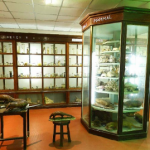The College’s vision speaks about ‘cultivating a concern for the environment’ and its emblem has a section with the river (of wisdom) flowing amidst the greenery of trees of the West and the East.
College Environment Policy – It is one of the few colleges having an environment policy of its own and the first of its kind in the state to do so. The policy goes thus:
Sacred Heart College is committed to protection and promotion of life on the planet. It believes in ‘go-green and grow green’. As a matter of practice, it shall,
- Seek to spread and deepen awareness on environment issues and an environment friendly life-style among the academic community and neighborhood community
- Pay special attention to minimizing waste, with ‘zero waste’ as the ideal, managing it properly with advance planning of this aspect of our activities/programmes/celebrations, and avoiding/minimizing the use of disposables and flex banners
- Introduce recycling at the student level through entrepreneurship development cell, and at the college level, by establishing a paper recycling unit in due course
- Tap renewable energy resources and introduce water recycling by 2019.
- Protect and promote diversity, especially of indigenous and coastal flora and fauna and their documentation.
- promote organic vegetable and food production on and off-campus
Promoting Food crop biodiversity
Wet land farming – Thottara Puncha It led the paddy farming activity in the college owned farm at Arayankavu, which has led to the revival of organic paddy cultivation in Thottara Puncha. 3.5 acres were cleared and almost 400 students took turns in clearing, sowing, planting and weeding the farm. The species that is being cultivated is IR5 rice variety. The process is also part of learning for the students. During this year 2.5 tons of rice were produced.
Upland farming – A plot of 10 cents on the campus was cultivated during the rainy season with active support from NSS volunteers and the members of Agriculture club.
One cent farming
The College has initiated a novel agriculture practice, ONE CENT FARMING; in which the students are encouraged to cultivate various vegetable crops in a limited space. Two such models were developed on the terrace and two of them were installed adjacent to the college ground. The once cent plot contains several vegetable crops such as tubers (Tapioca, sweet potato, dioscorea, colocasia, amorphophalus etc.) leafy vegetables (Chuvanna cheera, pacha cheera, sambar cheera, velicheera, agaththicheera, marakkeera, vallicheera, chayamansa), gourds (cumber, bitter gourd, snake gourd, ash gourd etc.), other vegetables like ladies finger, brinjal, chilly varieties, coriander leaves, mint, tomato, citrus, ivy guard, etc. One plot was dedicated to ‘pulses’ and it contains five varieties of pulses (amara, tuvara, kuttipayar, french beans, meter payar). The pulses yielded almost a quintal. It had a fence of ‘tuvar’ dal. The pulses plot was executed with the active support of Dr. Fr. Joseph & Fr. Sabu of English department. Total yield of pulses was more than 100 kg during last year.
Terrace farming
The college has two terrace farming models in which vegetable varieties and tuber varieties are cultivated.
Mushroom Cultivation : The college has a small mushroom cultivation unit run by Botany students.
Centre for Organic Farming, Bio-diversity and Ornithology– Arayankavu






